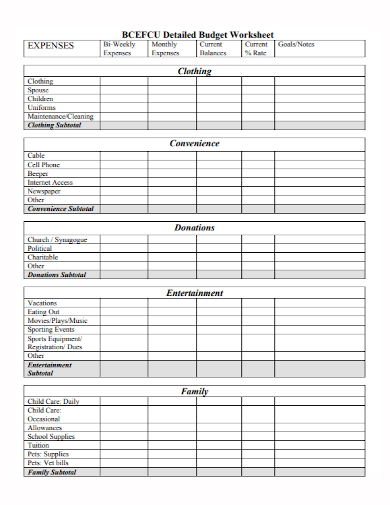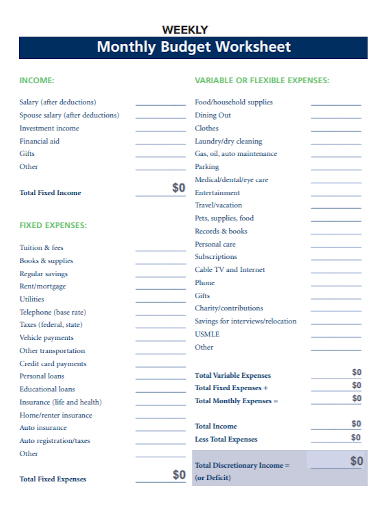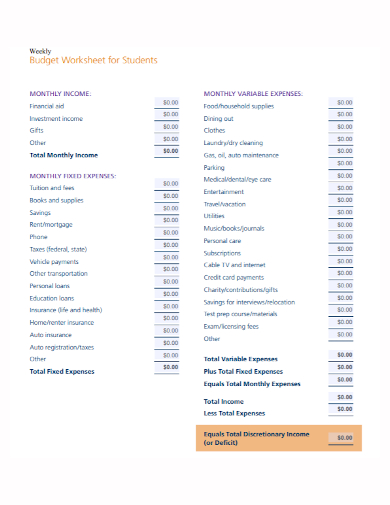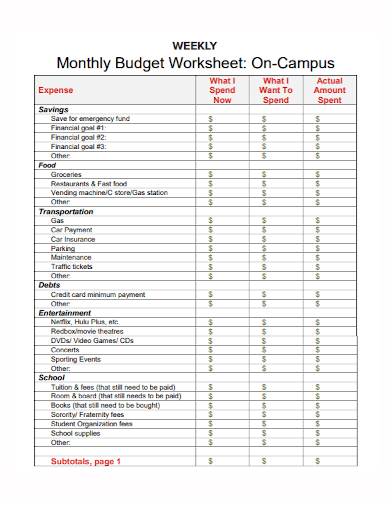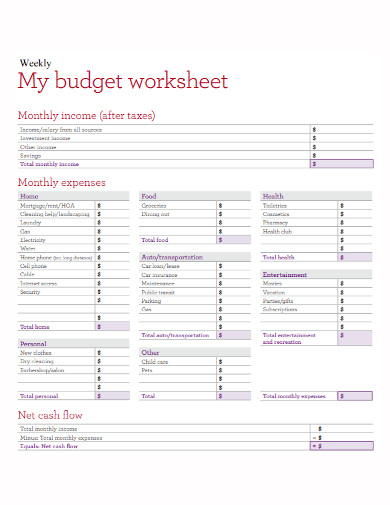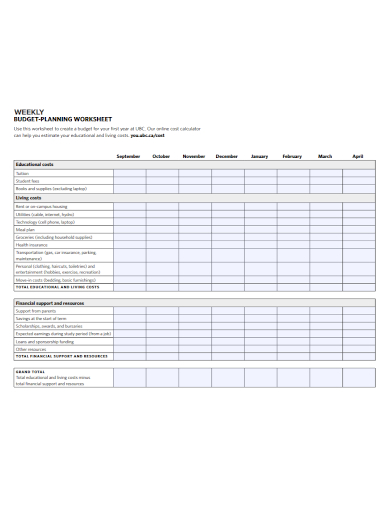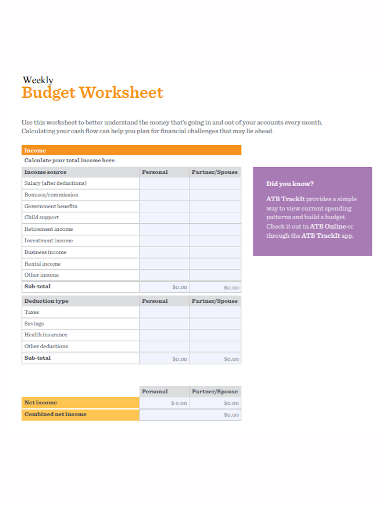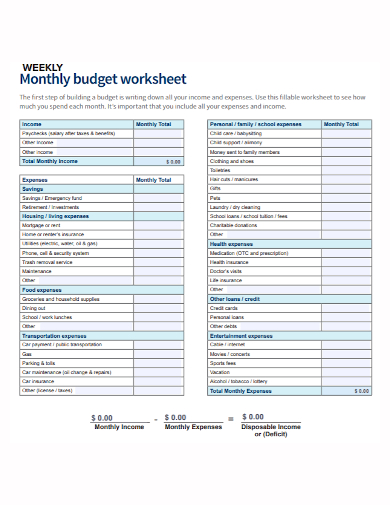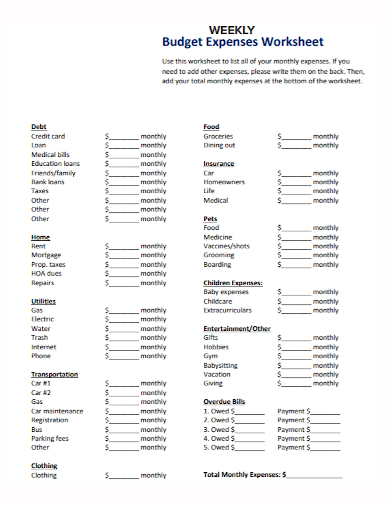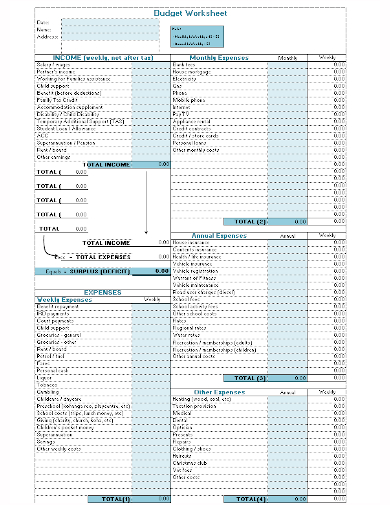Have you ever wondered why you’re budget is always depleting before the week is over? Has it bothered you that you cannot budget your finances well? Maybe you need a budget worksheet, specifically a weekly budget worksheet. Having a budget worksheet every week helps you closely monitor what is going on with your finances; where do they flow. How much have you spent on something? How much money will you be receiving this week? By monitoring your finances closely, you’ll be able to analyze your spending habits and you can change it by spending less on things you don’t need and by figuring out how much money will you be able to save and how much money will go into the different expenses you always have. Read the article to know how to make a weekly budget worksheet.
10+ Weekly Budget Worksheet Samples
1. Weekly Budget Worksheet Template
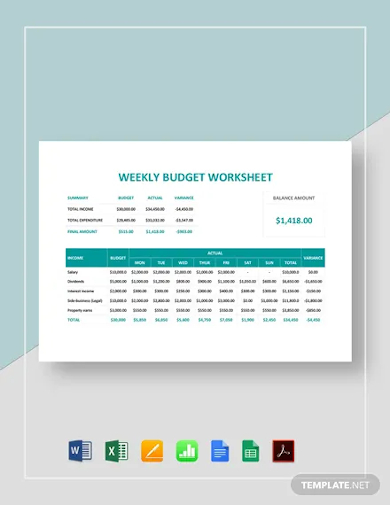
2. Bi-Weekly Budget Worksheet
3. Weekly Income Budget Worksheet
4. Student Weekly Budget Worksheet
5. Campus Weekly Budget Worksheet
6. Individual Weekly Budget Worksheet
7. Weekly Budget Planning Worksheet
8. Sample Weekly Budget Worksheet
9. Weekly Monthly Budget Worksheet
10. Weekly Budget Expenses Worksheet
11. Standard Weekly Budget Worksheet
Importance of Having a Budget
The more you control your spending habits, the more you can track your expenses which in turn save you more money over time. Though this may be challenging at first, its long-term result will lead to financial stability.
How to Create a Weekly Budget
1. Know Your Income
Understanding how much you make will determine how much you can spend. You may start by listing your income from multiple streams like salary, tips, and bonuses.
2. Keep Track of Your Expenses: All of Them
Personal finance software systems may help you track your expenses and categorize them into two categories: fixed and variable living expenses. In this instance, fixed expenses may refer to rent while the latter may include food and gasoline which may inflate each month. Know how much you’re spending. This is where the tough part comes in as you factor in everything that you have to pay for in a month. First, think of the things that you have to pay in fixed terms and then move on to the things that fluctuate each month. Remember that every cent counts.
3. Split Your Outgoings into Mandatory and Lifestyle
Now you have to add all of your monthly expenses in the same category. It is important that you begin with your fixed expenses first and then you move on to listing variable expenses like food and electricity.
4. Look for Ways to Cut Spending
Subtract your expenses from your income. The golden rule is that your expenses should not account for over 80% of your earnings and if it does, maybe it is time for you to consider which costs need to be reduced or completely removed.
5. Think About the Future
Reward yourself by thinking about what would you want to get out of your budget: it can be a dream home or vacation. Whatever it is, it’s best to think of it to keep you close to your goals.
6. Choose Goals You Can Meet
Lastly, think of goals that you can achieve within a short time span. This allows you to feel rewarded for your efforts and make you feel good and thus; allowing you to keep up with the habit of saving money.
FAQs
[/ns_row]
What are the four types of expenses?
There are four types of expenses that every individual has. These are:
- Fixed expenses: These are standard or set expenses that you have every week or month, quarterly, or annually on a certain amount. Some examples include bills, utilities, subscriptions, membership, laundry service, daycare payment, just to name a few.
- Recurring expenses: These expenses are what you expected to pay from time to time. Examples of these recurring expenses are groceries and gasoline, just to name a few.
- Non-recurring expenses: These expenses only happen rarely or just a few times in a year. Some examples of these are car registration fees, tax payments, clothes, travel, just to name a few.
- Whammies: These expenses are the ones that you pray won’t happen; they are the ones that will unpredictably arrive and hurt your budget. Instances such as natural disasters, emergencies, incidents, or accidents can cost you a lot of money.
Once you’re done creating your budget worksheet, make sure to use it regularly to track and analyze your progress and your spending habits to improve it. Using your budget calendar frequently can do wonders for your behavior towards your finances and even help you do smart financial ways for you to smartly use your money and even get richer by spending less on unnecessary stuff. If you put in the work and dedication yourself to becoming better at handling money, you can easily reach your financial goal. To help you get started to create your budget worksheet, download our free sample templates above to use as your reference!
Related Posts
FREE 24+ Progress Worksheet Samples in PDF | MS Word
FREE 30+ Development Worksheet Samples in PDF | MS Word
FREE 33+ Course Worksheet Samples in PDF | MS Word
FREE 16+ Verification Worksheet Samples in PDF | MS Word
FREE 14+ Feedback Worksheet Samples in PDF | MS Word
FREE 50+ Assessment Worksheet Samples in PDF | MS Word
FREE 25+ Campaign Worksheet Samples in PDF
FREE 50+ Application Worksheet Samples in PDF | MS Word
FREE 10+ Distribution Worksheet Samples in PDF
FREE 10+ Family Worksheet Samples in PDF
FREE 10+ Personal Worksheet Samples in PDF
FREE 7+ Depreciation Worksheet Samples & Templates in PDF | MS Word
FREE 10+ 4th grade Worksheets Samples in PDF
FREE 10+ Expense Worksheet Samples in PDF
FREE 10+ Investment Worksheet Samples in PDF

